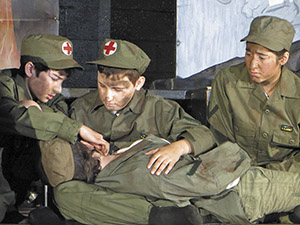


Paramus—In the 1950s, when my schoolmates and I grew up in what came to be known as “the Fourth Reich” of Washington Heights and attended the Jewish schools of that time, we all seemed to be short of relatives.
Our experience back then as mostly children of European parents was weird in many ways, even for those of us whose parents’ arms did not bear gruesome numbered tattoos. As an adult, one of my earliest memories is of how as a small child I noted my parents discussing a man they encountered on a Washington Heights street as someone they suspected of being a Nazi they recognized. Perhaps my memory is true, perhaps not. At any rate we always had a foreboding knowledge that something terrible had transpired in our parents’ time.
Certainly, we did not find our day school life focused in any way on what in later decades came to be known as the Holocaust. Our grandchildren, by contrast, have had a different experience. Protected at home from much immediate experience of the Holocaust by a generational shift (most of their great grandparents are gone), their schools have taken on the responsibility of establishing Holocaust awareness for them. In their upper elementary grades students are indeed led to a sharp focus by their various schools upon that condition which deprived my generation of so many grandparents, uncles, aunts, and cousins.
Yavneh Academy (which some of my grandchildren have attended) each year devotes much effort to producing a Holocaust-themed play. This year the play offered is one adapted by Yavneh students themselves from New York Times columnist Roger Cohen’s 2005 book, Soldiers and Slaves: American POWs Trapped by the Nazis’ Final Gamble. On Thursday, March 19, an original play called simply “Soldiers and Slaves” was put on twice, once at 10 am for an audience mainly of Yavneh students and other youngsters from area schools both private and public, and again in the evening for a public audience consisting mainly of the students’ families and some of the survivors of the episode covered in the play. Prior to the play relatives of some survivors lit memorial candles. The location was the Jewish Center of Teaneck.
In this play, based on true events, the Berga concentration camp (described in the playbill as the American GIs’ “own bitter taste of Hell”) is brought to life in all its terror. This was where Jewish American prisoners of war or those presumed by the Nazis to be Jews were subjected to an inhuman horror regimen common to other concentration camps. Of the 350 Americans captured during the Battle of the Bulge in the winter of 1944–45 or elsewhere, who were identified as Jews and taken to Berga to work as slaves on puny diets, more than 70 perished. A special privilege for the evening audience was the appearance via Skype (thanks to diligent tracking by one of the students) of 90-year-old Morton Brooks, a survivor of the Berga camp, a sub-camp of Buchenwald. Also speaking, in person, was the widow of the late prisoner Gerald Daub, who survived in Berga due to a close friendship (that came to last the remainder of his life) with an elementary school classmate he was reunited with there. Mrs. Daub explained how huddling at night with a friend who made sure one’s socks stayed in place against frostbite was vital to survival.
The play’s producer, Rabbi Shmuel Burstein, has for many years doubled as Holocaust Studies Director at Yavneh. His mission is to bring his young charges, through the art of drama, closer to a comprehension of the incomprehensible that is the Holocaust.
As always, Ms. Dominique Cieri, the outstanding director of the Yavneh plays each year for the past two decades, manages to involve every member of the school’s eighth-grade class in the production. Her supervision of scripting, acting, costumes, lighting, and sound helped to make “Soldiers and Slaves,” her 20th production for Yavneh, a rousing success. As always, the audience leaves the annual Yavneh Holocaust play this year impressed and informed about a nuance of the Holocaust most had previously been unaware of.
Several threads pass through the play. Nazi duplicity, general viciousness, and illegal bypassing of POW requirements under the Geneva Convention hardly surprise. The challenge of how to stand together in the face of Nazi demands that American Jews turn themselves in at the initial stalag produces a frisson of tension. Should Jews head off for what they fear is a rendezvous with death or should they and their gentile peers risk Nazi collective punishment? Most shocking is the difficulty of survivors’ families to get just recompense for their loved ones’ suffering or even basic information about what happened because of US decisions to sweep Berga under the carpet as part of Cold War strategizing.
As Yavneh’s principal, Rabbi Jonathan Knapp, pointed out in introducing the evening production, since last year’s play was put on, many terrible events of anti-Semitism and anti-Israel hatred have transpired abroad and at home. The goals and purposes of Holocaust education must not be, he argued, relegated to just the death and destruction of the past but must rather be focused on renewal and vigilance on behalf of decency.
This grandfather was very pleased by his grandchild’s performance in “Soldiers and Slaves” and is grateful to Yavneh for giving her the opportunity to learn so very much through this play.
by Henry Frisch










